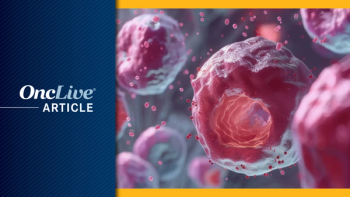
- Contemporary Oncology®: Biomarkers, Pathways, and Targeted Therapies® - January 2024
- Volume 1
- Issue 1
Rate of End-of-Life Immunotherapy Is on the Rise in Advanced Melanoma, NSCLC, RCC

The initiation of immunotherapy at the end of life among patients with advanced cancers is increasing over time.
The initiation of immunotherapy at the end of life among patients with advanced cancers is increasing over time, according to findings from a cohort study led by investigators at the Yale School of Medicine.1,2
Data from the study, which were published in JAMA Oncology, demonstrated that among 242,371 patients who were analyzed the percentage of patients who received end-of-life immunotherapy increased over time for all cancers. The study included patients with stage IV melanoma (n = 20,415), non–small cell lung cancer (NSCLC; n = 197,331), or renal cell carcinoma (RCC; n = 24,625). During the study period, the percentage of patients with metastatic disease who started immunotherapy within 1 month of death increased from 0.8% to 4.3% for patients with melanoma, 0.9% to 3.2% for patients with NSCLC, and 0.5% to 2.6% for patients with RCC.2
“Immunotherapy has revolutionized the field of oncology over the last decade,” Sajid A Khan , MD, FACS, FSSO, senior author of the study, the codirector of Team Science at the Yale Center for Clinical Investigation, as well as section chief of hepato-pancreato-biliary (HPB) and mixed tumors and an associate professor of surgery (Oncology) at Yale School of Medicine in New Haven, Connecticut, said in a press release. “Because survival is substantially improved for many patients treated with these drugs, its overall application has increased across the United States.”1
To conduct their study, investigators used the National Cancer Database to collect data from patients with the 3 cancers with the highest volume and longest longitudinal experience with immunotherapy, stage IV melanoma, NSCLC, and RCC. The beginning of the study period for each cancer type was the year immediately following the FDA approval for the first immune checkpoint inhibitor for the treatment of stage IV disease for that malignancy, which was 2012 for melanoma and 2016 for NSCLC and RCC. The end of each study period was 2019.2
The retrospective study included patients with both clear cell and non–clear cell KCC; all patients needed to be at least 18 years old and have stage IV disease. Those with unknown immunotherapy status or unknown timing of immunotherapy and those without reported follow-up data were excluded.
The primary outcome was the rate of initiation of immunotherapy in the last month of life. Independent variables of interest included facility type and hospital volume.
At baseline, the mean age for all patients was 67.9 years (standard deviation, 11.4), 42.5% were older than 70 years, 56.0% were male, and 29.3% received immunotherapy. In the melanoma cohort, most patients did not receive immunotherapy (57%), 41% received immunotherapy and lived longer than 1 month after initiation (non–end of life immunotherapy), and 3% received immunotherapy initiation at the end of life. In the NSCLC cohort, these rates were 72%, 26%, and 3%, respectively. The rates were 73%, 26%, and 2%, respectively, for patients with RCC.
Additional findings from the study showed that end-of-life treatment as a percentage of all immunotherapy and chemotherapy treatments were approximately constant over time among patients with NSCLC or RCC. In the melanoma cohort, the proportion of chemotherapy treatments initiated at the end of life decreased from 8.8% in 2012 to 5.1% in 2019 (P = .04), and the proportion of immunotherapy treatments that were end-of-life initiated increased slightly from 5.0% to 6.9% (P = .20).
Treatment at an academic or a high-volume center was associated with a significant decrease in the odds of patients receiving end-of-life initiated immunotherapy; patients treated at these facilities were 31% (OR, 0.69; 95% CI, 0.65-0.74; P < .001) and 30% (OR, 0.70; 95% CI, 0.65-0.76; P < .001) less likely to die within 1 month of the initiation of immunotherapy compared with those who received treatment at a nonacademic or very-low volume center, respectively.
Additionally, the presence of metastases in at least 3 solid organs was associated with increased odds of end-of-life initiated immunotherapy across all 3 cancer types compared with distant lymph node metastases only. The ORs in the melanoma, NSCLC, and KCC cohorts were 9.98 (95% CI, 4.03-24.67), 3.61 (95% CI, 2.87-4.55), and 3.26 (95% CI, 1.66-6.40), respectively.
In the NSCLC cohort, patients aged 51 to 70 years (OR, 1.36; 95% CI, 1.15-1.62; P < .001) and aged older than 70 years (OR, 1.58; 95% CI, 1.31-1.89; P < .001) experienced increased odds of receiving end-of-life initiated immunotherapy compared with those 50 years and younger. Burden of comorbidities by Charlson-Deyo Comorbidity Index was also a factor associated with increased use of end-of-life initiated immunotherapy; in the overall population, patients with Charlson-Deyo scores of 2 (OR, 1.36; 95% CI, 1.22-1.50; P < .001) or 3 or higher (OR, 1.58; 95% CI, 1.42- 1.76; P < .001) experienced increased odds of end-of-life initiated immunotherapy.
“Our study found that in the last 10 years, the initiation of immunotherapy in [what turned out to be] the final month of a patient’s life has significantly increased, accounting for 1 in 14 immunotherapy treatments overall,” Khan said. “The reason we focused on immunotherapy initiation at the end of a patient’s life with cancer metastasis was to see what we could learn about prescribing patterns. What we found we hope will serve as a harbinger for shifts in the clinical approach to patients with advanced cancer.”1
References
- Masciadrelli M. Immunotherapy for metastatic cancer on the rise, even near end of life. Yale School of Medicine. January 4, 2024. Accessed January 15, 2024.
https://medicine.yale.edu/surgery/plastics/news-article/immunotherapy-for-metastatic-cancer-on-the-rise-even-near-end-of-life/ - Kerekes DM, Frey AE, Prsic EH, et al. Immunotherapy initiation at the end of life in patients with metastatic cancer in the US. JAMA Oncol. Published online January 4, 2024. doi:10.1001/jamaoncol.2023.6025



































